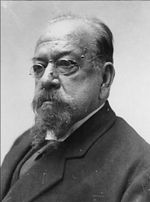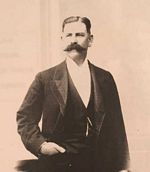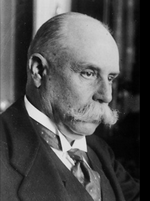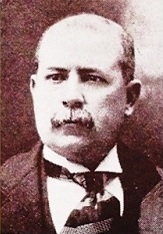Personnel of the Banco Comercial
Signatories
The signatories on the Banco Comercial notes were Miguel Ahumada as Interventor, Tomás MacManus and Enrique Creel as President, Ignacio MacManus as Director and José María Falomir as Manager (Gerente). Signatures were originally engraved on the plates, but in 1897 when the higher values were altered from 'en moneda de plata del cuño mexicano’' to 'a la par, en efectivo’' the title 'Director' was changed to 'Gerente' and the signatures removed except for the $5 note which had the engraved signatures of Creel and Falomir.
Interventor
|
Miguel Ahumada Sauceda was born in Colima on 29 September 1844. In his youth he worked as a carpenter and in customs inspection. He fought against the Imperialist government of Emperor Maximilian, initially under the command of General Ramón Corona and then under Sóstenes Rocha. He was a political prefect in 1875-1876, and a local deputy and Jefe de Armas in Colima in 1876. He subsequently was assigned to the Naval Customs Station in Guaymas, Sonora. Ahumada was in charge of the tax service (Jefe de la Gendarmería Fiscal) in Chihuahua in 1892 when Díaz chose him as the compromise candidate for the governorship to settle the political infighting between the Terrazas and Carrillo cliques. He was governor from 1892 until 1904 though he renounced the post in 1903 when he was elected governor of Jalisco, winning reelection until January 1911. During the Maderista revolt in 1911, Díaz once again called upon him to take over the governorship of Chihuahua but this time his influence and prestige were unable to deflect the revolution and he handed over the reins to Abraham González on 10 June. In 1913, he was a deputy in the 9th district of Jalisco in the legislative chamber called up by President Huerta. He was the President of the Chamber of Deputies in 1914. Ahumada was Interventor from at least December 1890 until May 1900 when the bank merged with the Banco Minero. |
 |
Presidente
|
Born on 16 May 1854, young Tomás spent his early life in Mexico along with his sister, Francisca, and his brothers, Ignacio and Francisco but in early 1864 was sent to board at St. John’s College, New York City. Returning home to Mexico after his years there, he joined the family business and found himself involved in real estate, international trade, mining and banking. Tomás Macmanus would become a prominent financial figure, not only in Mexico, but in the US and overseas in Europe as well. Later in his career, Macmanus would become involved with the booming North American railroad industry and would also turn to law and politics, holding various local offices and eventually serving as a state deputy, deputy to Congress, and senator for Chihuahua. He was a business associate of the Terrazas: for example, he was a shareholder in the surveying company, the Compañía deslindadora del Campo y Guerrero y socios, where the manager was Enrique Creel and another shareholder was Juan TerrazasThe law of 15 December 1883 for the survey and colonisation of uncultivated land (terrenos baldíos) authorised the government to contract with surveying companies to locate and measure terrenos baldíos and to give them in recompense a third of the lands which they surveyed. Whilst the companies were not permitted to dispose of the lands they acquired in blocks greater than 2,500 hectares (6,177 acres) this limit was evaded by the use of dummy companies. Tomás Macmanus was a state deputy when the concession was given to the Compañía deslindadora del Campo y Guerrero y socios in 1883. However, he made a bad decision and lost his fortune during the 1890s as on 8 October 1895 his estates were sold at public auction to satisfy a mortgage held by the Banco de Londres y MéxicoThe Two Republics, Vol. XLI, No. 62, 11 September 1895; Chihuahua Enterprise, 30 August 1895. The estate included the Hacienda de la Nariz, (over)valued at $280,000, its anexas ($70,000), the Hacienda de Bachimba ($57,000) and various houses in the city. Macmanus’ business, Concurso F. Macmanus é hijos, suspended payments to its creditors on 11 April 1893 (Periódico Oficial, 30 May 1896). On 9 May 1896 the Juez 2º de Letras announced that the sale of the goods of Francisco Macmanus Sucesores had raised $71,905.17 (Periódico Oficial, 9 May 1896) and on 26 May 1896, paid a 10% distribution to creditors (Periódico Oficial, 30 May 1896). In later years he was solicitor acting for the Greene Gold Silver Company (in 1905), the Cananea Consolidated Copper Company (in 1906), the Sierra Madre and Pacific Railroad Company (in September 1908) and the Parral and Durango Railroad (in 1913). He took part in the negotiations over Madero’s renunciation and after Huerta’s coup d'etat remained as senator for Querétaro and helped arrange Huerta’s loans from English banks. He died in Cuernavaca on 18 September 1945. |
 |
|
Creel was born in Chihuahua on 31 October 1854, the son of merchant Reuben Waggener Creel, who had come to Mexico from Kentucky in 1845, and Paz Cuilty de Creel, one of General Luis Terrazas' sistersReuben W. Creel was born 1815 in Green County, Kentucky. Reuben grew up on a large tobacco plantation in the Green River area that had been established by his father. He was educated at the little Jesuit college of St. Mary's near Bardstown. His instructor in the languages was Louis Phillippe of France, who later returned to France to reign as King. According to a newspaper account, "he was very fond of the languages and was as well versed in Spanish and French as in his mother tongue, English." Reuben went to Mexico as an interpreter for Gen. William T. Ward, husband of Sally Tobin Creel, during the Mexican War in 1847. After the war he returned home, and later was appointed American Consul to Mexico on 12 August 1863 in Chihuahua. It was in his capacity as consultant that Reuben met General Luis Terrazas, who at the time was Governor of Chihuahua. Reuben and Terrazas married sisters, Maria de la Paz Cuilty and Carolina Cuilty Bustamante, Reuben marrying on 8 July 1853 in Chihuahua. The Cuiltys were among the largest landowners in the state. Reuben's first son was named after Henry Clay, the American statesmen he admired the most. Reuben was U.S. consul in Chihuahua during the French intervention.. In his teens Enrique sold cigars and cigarettes on the streets and taught night school. His family's financial difficulties ended his formal education, but his mother, a schoolteacher, undertook his training at home. At fourteen, Enrique managed a small store for his father; after Reuben died in 1871, the seventeen-year-old Creel borrowed three hundred pesos and went into business himself. By the time he was twenty-five, he had "one of the best mercantile houses in Chihuahua." J. Adolphus Owens, Anywhere I Wander I Find Facts and Legends Relating to the Creel Family, Alabama, 1975: Chihuahua Mail, 17 October 1882. In 1880 he married Angela Terrazas, the daughter of Luis Terrazas. Through his family connections, vast personal wealth and astute business sense Creel was a prominent member of the oligarchy that came to dominate Chihuahuan industry, politics and the courts. He was elected regidor of Chihuahua in 1878. He was a deputy in several legislatures and at times represented Chihuahua and Durango. He substituted for his uncle, Luis Terrazas, as governor from August 1904 to December 1906, when he went to Washington as Mexican ambassador. He was state governor from October 1907 until 1911 and at times also minister of foreign relations. Creel began his banking activities in 1881 as manager of the branch of the Banco Minero in El Paso del Norte (now Ciudad Juárez) and ended up as President of the bank. As manager of the Terrazas family's banks, he ruled over an empire that counted more than two hundred million pesos in assets, almost a fifth of the nation's total bank assets in 1910. As well as his interests in Chihuahua, he presided over or had substantial interests in banks in Mexico City, Nuevo León, Durango, Guanajuato, Sonora, and the United StatesHe was associated with the Sonoran elite as president of the Banco Mercantil de Cananea (Mexican Herald, 22 January 1906, and Mexican Investor, 3 February 1906); in partnership with Joaquin Casasús and several Monterrey entrepreneurs, he founded the Banco Mercantil de Monterrey in 1889; he was also a large stockholder in the Banco Oriental de México and a board member of the Banco de Guanajuato. His most ambitious projects were two large banks in Mexico City. Creel founded the Banco Central Mexicano in 1899 to provide "a mechanism in Mexico City" for state banks of issue to circumvent the currency monopoly of the Banco Nacional. By 1910 it had become Mexico's second largest bank, with assets of ninety million pesos. He also set up the Banco Hipotecario de Crédito Territorial Mexicano, which had thirty-eight million pesos in assets in 1910, to furnish long-term, low-rate mortgages to finance the modernization of agricultural properties. Thus Creel played a crucial role in coordinating native and foreign banking interests. After 1900, as the Mexican member of important international financial committees, he established a worldwide reputation. In matters of national monetary policy, Creel ranked in importance second only to José Ynes Limantour, Diaz's minister of finance, and he was instrumental in formulating many of the fiscal policies of the dictatorshipHe was president of the Comisión de Cambios that planned the monetary reforms of 1905. He travelled widely on behalf of the government and was well-known in financial circles in New York and Paris. After Huerta's defeat and exile, Enrique Creel was one of those who journeyed to Spain in 1915 to persuade the general to return, and thereafter worked with other exiles to circumvent the revolution. Creel never fully won the trust of his nationalistic Mexican compatriots. As his critic Bulnes put it, Creel was 'half yankee by blood' and 'by character and education a yankee-and-a-half'. He died on 17 August 1931 in Mexico City. |
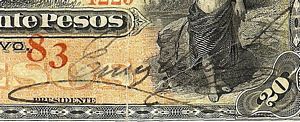 |
Director
|
He died on 22 November 1932 in Glendale, California. |
 |
Gerente
|
José María Falomir Gastelum was born in Yecorato in the district of El Fuerte, Sinaloa on 2 December 1827. The Falomirs were political allies of the Terrazas with large landholdings around the city of Chihuahua, in Aldama and in Ciudad Jiménez. José María served as a deputy to the local legislature. José María married three times and had 14 children. From his first marriage he had a son, Ponciano Falomir Casares, From his second a daughter, Mariana Falomir Albiztegui, married Pedro Olivares Zuloaga in 1883. Fom his third Falomir had sons, Martín and Jesús José Falomir Caballero, and a a daughter, Josefina Falomir Caballero, who also married Pedro Olivares Zuloaga (in 1897). Falomir was manager between April 1894 and April 1900 though in 1895 and 1896 his office was frequently covered by Luis Rosas or Ponciano Falomir. He died in Chihuahua on 11 May 1900La Patria, 17 May 1900, at the age of 72. |
 |
Other personnel
Other people associated with the bank were:
| J. Allard was cajero in December 1891 and contador between April 1892 and 1900, though from 1893 onwards the balance sheets were signed on his behalf by the cajero Augusto G. Lowere. | |
| Juan Andrew Creel was born in Chihuahua in 1865, the brother of Enrique Creel. He went on to be manager of the Banco Minero. | |
| Jesús José Falomir was assistant manager (subgerente) in May 1900 and later worked in the Banco Minero. Born in Chihuahua on 25 December 1873, like Martín Falomir, he also married into the family of José María Maytorena of Sonora, marrying the daughter Armida Maytorena Tapia. He died in Chihuahua on 8 September 1935. | |
| Ponciano Falomir Casares, a half-brother of Martín Falomir, was born in Chihuahua on 19 November 1847. A businessman in Santa Eulalia, he owned 270,000 acres of land. He covered for his father, José María Falomir, as manager between July and October 1896. He died in Mexico City on 14 October 1917. | |
|
Adolph Krakauer was manager of the Ciudad Juárez branch in March 1888. Adolph Krakauer was born in Fürth, Bavaria, on 23 May 1846 and emigrated to New York in 1865 and was employed as a clerk there. In 1869 he moved to San Antonio, Texas, where he went to work for Louis Zork, a leading merchant. He married Zork's daughter Ada and became a member of the firm. In 1875 he moved to El Paso, where in 1885, with his brother Máximo, brother-in-law Gustave Zork and Ed Moye, he opened a hardware store on South El Paso Street. The company became a leading wholesale hardware dealer in the Southwest, with a branch in Chihuahua. Krakauer also became president of Two Republic Life Insurance Company, the Krakauer-Zork Investment Company, and the Mountainside Realty Company and director of the First National Bank and the Rio Grande Valley Banking and Trust Company. He also owned extensive real estate in El Paso. He served as county commissioner and alderman and was elected mayor as a Republican after a bitter election campaign in 1889 but never assumed the office, as it was discovered he had not taken out his final citizenship papers. He died of a heart attack in El Paso on 22 January 1914, and was survived by three childrenEl Paso Herald, 22 January 1914. Krakauer, Zork y Moye opened in Chihuahua in 1890 . Their hardware store stood in front of the Cathedral on calle Libertad and calle Segunda and sold all sorts of hardware and, most importantly, dynamite in 50 pound boxes (stored offsite on the outskirts of the city). |
|
| Máximo Krakauer was on the board in March 1888. He had two sons, Julio and Adolfo, the last of whom took care of the hardware from the 1920s until 1948, when the business was sold. Maximo Krakauer died in El Paso in 1930, at the age of 65 years. | |
| Ralph L. O'Neill was the nephew of Francisco MacManus and in charge of the hacienda at Bachimba in 1880Grant Shepherd, The Silver Magnet, New York, 1938. He was contador from at least December 1890 until April 1892. He must have followed Ignacio MacManus to Cananea as in 1906 he was manager of the Compañía Bancaria Mercantil de Cananea, the banking business of the Cananea Consolidated Copper Company. In 1913 The Oasis reported, 'Mr. R. L. O’Neill, the Cashier, has had thirty years experience in banking and commercial businesses in the Southwest, upon both sides of the international line, in Arizona and Texas, and in Sonora, Chihuahua and Durango; and he is in complete and thorough touch with all the great and varied interests of all that vast region of illimitable resources, which gives the institution under his management a great advantage in dealing with men and conditions'The Oasis, 25 December 1913. | |
| Carlos Pérez: | |
| Luis Rosas frequently covered for José María Falomir as manager in 1895 and 1896. | |
| Alberto Terrazas was the son of Luis Terrazas, born in September 1869. In 1910 Díaz felt he need to bind the Terrazas more closely to his rule and in December chose Alberto as governor of Chihuahua to replace Creel and Terrazas’ creature, José María Sánchez. However, Alberto was unable to stave off the rebellion and was replaced by the firmer pair of hands of Miguel Ahumada in January 1911. He was driven out of Chihuahua in 1914 but returned after the revolution in 1920. He was married to Emilia Creel, Enrique's daughter and his own niece. He died in El Paso in 1926. | |
| Federico Terrazas was another son of Luis Terrazas. | |
| Juan Terrazas Cuilty was a son of Luis Terrazas and a vocal on the board of directors. Born in the city of Chihuahua in 1852, as a member of the family he owned vast estates, had interests in several companies, including as Tesorero of the Batopilas Mining Company, and a distinguished political career, including local deputy and senator for Campeche. In 1878 he established a general store, 'Juan Terrazas', at calle Juárez 601, Chihuahua. He was President of the Cámara de Comercio, Industrial, Agrícola y Minera de Chihuahua in 1900, 1902, 1909 and 1910. He died in Chihuahua in 1925. |
|
| Luis Terrazas was on the board. | |
| Luis Terrazas, hijo was on the board in 1888 | |
| [ ] Von Düring appears in the balance sheets as manager from April 1893 until March 1894. |

